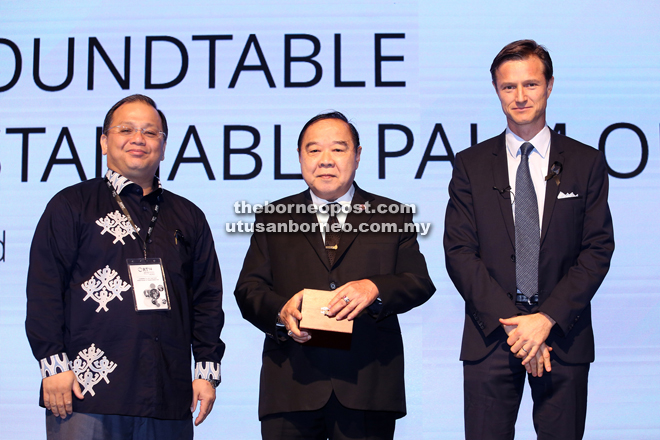
Bek-Nielsen (right) and Webber (left) pose for a photo with Wongsuwan after presenting him with a souvenir at RT14 yesterday.
BANGKOK: The Roundtable on Sustainable Palm Oil (RSPO) has reaffirmed its commitment to ensure no stakeholders are left behind in the transformation process.
RSPO co-chairperson Datuk Carl Bek-Nielsen said this included the smallholders.
“This segment of the production chain makes up 50 per cent of producers in Indonesia, 40 per cent in Malaysia and 80 per cent in Thailand.
“Therefore, it must be our obligation to appreciate and respect that the RSPO has no desire to leave the smallholders out of this journey,” he said at RSPO’s 14th annual roundtable meeting (RT14), which was also attended by Thailand’s Deputy Prime Minister Gen Prawit Wongsuwan here yesterday.
Bek-Nielsen pointed out that RSPO had to accept that the smallholder fraternity, unlike many private companies, would require additional resources, time and help.
According to him, if RSPO failed to do so, they risked having the smallholders turn their backs on them.
“They will turn their backs on the RSPO and accuse the RSPO of not fulfilling the spirit of the United Nations creed on sustainable development, namely, and I quote, that ‘sustainable development must go hand in hand with action to raise the living standards of the poor’,” he stressed.
On RT14, Bek-Nielsen said the conference aimed at stimulating progress through participants sharing and exchanging views on various topics.
“There are numerous other challenges and topics that we must find time to discuss during RT14, where special emphasis will be given on social issues within the palm producing regions and how these can be improved.
“It is a balance and subjects right from human rights to environmental conservation. These are topics that are known to create intense debates.”
Meanwhile, Wongsuwan said over 90 per cent of Thailand’s oil palm growers were smallholders with limited knowledge on best management practices.
“This led to high loss in production, harvesting and processing, resulting in higher production cost when compared with major producers in places such as Malaysia and Indonesia.”
In view of this, he said the Thai government established the National Oil Palm Policy Committee to oversee the situation.
“The committee has approved Oil Palm and Palm Oil Industries Development Strategy (2016-2036) as a framework to develop the industry, according to the National Agriculture strategy, to increase the competitiveness and sustainable resource utilisation,” he said, adding that the strategy focused on six dimensions: production; innovation; oil palm and palm oil standard; energy; marketing and sustainable resource management.
During the conference, RSPO launched a video campaign to promote its new RSPO Trademark Mobile App that will allow consumers to identify and geolocate products carrying the RSPO Trademark.
This initiative is to increase consumer awareness on Certified Sustainable Palm Oil and to help consumers have a say with their shopping choices.
The two-day RT14, held at Shangri-La Hotel Bangkok, was attended by more than 800 representatives from leading figures in the palm oil industry, corporate leaders in sustainability, financial institutions, policymakers, and academics as well as social and environmental non-governmental organisations (NGOs) from 46 countries.
Also present was RSPO chief executive officer Datuk Darrel Webber.
